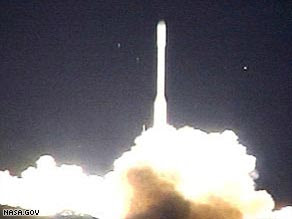
WASHINGTON: The United States on Tuesday defended the use of the dollar as a key global currency, shrugging off China's calls to ditch the greenback as the international reserve currency.
President Barack Obama told a White House press conference that "the dollar is extraordinarily strong right now," and although the United States was "going through a rough patch" at present, it enjoyed a "great deal of confidence" from investors.
"I don't believe there is a need for a global currency," Obama said.
But People's Bank of China Governor Zhou Xiaochuan's call to replace the dollar, installed as the reserve currency after World War II, with a different standard run by the International Monetary Fund was a "serious" proposal, a senior IMF official said.
Meanwhile, a top economic official from the European Union, whose single currency is gaining an increasing share among central banks as a reserve currency, said the dollar remained unchallenged as the dominant reserve unit.
US Federal Reserve chief Ben Bernanke and Treasury Secretary Timothy Geithner said at a Congressional hearing that they would not allow the dollar to be stripped of the premier reserve status as suggested by Beijing.
At the hearing, a lawmaker asked the two financial chiefs: "Would you categorically renounce the United States moving away from the dollar and going to a global currency as suggested by China?"
Geithner immediately responded, "I would."
"And the chair?" the lawmaker asked, turning to Fed chairman Bernanke.
"I would also," Bernanke said.
China is the largest creditor to the United States, being the top holder of US Treasury bonds worth US$739.6 billion as of January, according to US figures. It is also the world's largest holder of US dollars as a reserve currency, at more than one trillion dollars.
In such a dominant position, "China appears to be growing more and more assertive over it's rights," noted currency analyst Andrew Busch of BMO Capital Markets.
Zhou's comments came just two weeks after Chinese Premier Wen Jiabao, in a rare expression of concern, called on US economic planners to safeguard Chinese assets.
"We have lent huge amounts of money to the United States. Of course we are concerned about the safety of our assets," Wen said as the United States grappled with the worst financial turmoil since the Great Depression.
The latest Chinese concern came as the dollar took a beating following the Federal Reserve's decision last week to buy up to US$300 billion in long-term US Treasury bonds and boost its purchases of mortgage securities by US$750 billion in an effort to revive the ailing economy.
The decision, according to foreign exchange dealers, made US assets less attractive to investors worried that the Fed move would end up debasing the world's reserve currency.
Despite the financial meltdown at home, the dollar has been mostly regarded as "safe haven" by investors averting risks amid a global economic slump.
Zhou suggested the IMF's Special Drawing Rights, a currency basket comprising dollars, euros, sterling and yen, could serve as a super-sovereign reserve currency, saying it would not be easily influenced by the policies of individual countries.
The idea of a global currency, determined by multilateral organisations, is not new, said John Lipsky, the IMF's first deputy managing director.
"But it's a serious proposal," he said in Washington.
And he hastened to add, "I don't think even the proponents think it as a short-term issue but as a longer-term issue that merits serious study and consideration."
EU Economic and Monetary Affairs Commissioner Joaquin Almunia said the dollar would remain unchallenged as the top reserve currency even as emerging economies such as China play a more critical role in the global economy.
"The relative economic powers are changing," he told a news conference at the European Parliament in Strasbourg, France.
"But I don't expect major structural changes in the role that the dollar plays today as a reserve currency."
The debate over the dollar's role came ahead of the G20 summit of developing and industrialised nations on April 2 in London, where world leaders and international organisations, including the IMF, are to discuss reforming the financial system.
Russia has also proposed the summit discuss creating a supranational reserve currency. The IMF created the SDR as an international reserve asset in 1969, but it is only used by governments and international institutions.
"The arguments for doing such a thing have economic merit, though the actual implementation of such a system would likely take a Herculean effort and a great deal of consensus building amongst economic powers," said Sacha Tihanyi, currency strategist with Scotia Capital. channelnewsasia Read More..






